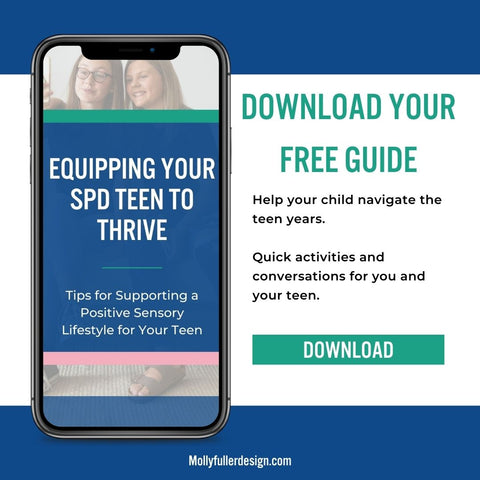It’s a mistake to keep using the same self-regulation techniques meant for kids on your growing teen. Your teen might no longer want to jump on a trampoline or depend on you to sit with them through a meltdown.
But, your role is still absolutely critical in bridging their transition to becoming more independent with sensory self-regulation. Promoting self-regulation in them now will only benefit them in the future.
You’ll find outlined in this article, 3 easy ways to promote self-regulation in your teen.
What is Sensory Regulation in Teens?
Sensory regulation is defined as using the senses to help regulate emotions or attention. The ultimate goal is appropriate attention and energy levels that match the demands of any given activity.
The opposite of regulation is dysregulation – where sensory systems get overwhelmed and emotions spiral out of control leading to outbursts, avoidance, and shutting down.
By recognizing your own emotions and reactions to sensory experiences, you can then begin to intervene at the right time. This looks like selecting the right calming sensory strategies to soothe the nervous system or alerting strategies to amp up the energy when feeling down.
The goal is for teens to start taking ownership over their own emotions and sensory experiences. This enables them to start recognizing their own needs and to select the right strategies for self-regulation.
Keep in mind, children and teens engage in a wide range of sensory experiences throughout their day, which could potentially be dysregulating or overwhelming: Everything from hallway and classroom chaos, busy sporting events, even high-pitched sleepovers.
With so many sensory situations to navigate, incorporating time for sensory reorganization should be a priority. Examples of this could range anywhere from carving out time for a calming activity after a busy school day, to dedicating extra time to prepare for a challenging social event.
Don’t worry, we’re here to help you with some teen-friendly sensory regulation support – from activities, discrete sensory items, to environmental considerations.
Explore Teen-Approved Sensory Regulating Activities
Let’s be honest here, your teen may no longer appreciate the swings, playgrounds, and obstacle courses associated with sensory interventions from childhood.
However, their sensory system may still really crave that sensory stimulation. So you need to fill this gap somehow.
There are a wealth of great sensory regulating activities, just waiting to be explored.
Here are some ideas to get you started:
- Weight-lifting – Amazing for providing deep pressure and expelling extra energy.
- Yoga – Weight bearing, breathing, and mindfulness are all very powerful concepts for sensory organization. They can also be modified for a range of ability levels.
- Outdoor adventures – Spending time outdoors helps reset the nervous system. Encourage your teen to put away the video games and go for a walk, ride a skateboard, or take up an outdoor hobby.
Really, you’re looking for activities they enjoy which also have a sensory component to help calm or activate the nervous system.
It may take some trial and error to find the right activity and routine that supports the sensory self-regulation for your teen. However, rest assured that the right activities will help the rest of the day be more successful and relaxed.
Offer the Right Tools to Support Regulation
As a parent, you can’t be with your teen every minute of the day to help them navigate stressors or new experiences. They are going to be making their own decisions.
However, what you can do is make teen-friendly sensory tools readily available and easy to use.
- Age-appropriate Fidgets – Increase focus, attention, and calm using fidgets that keep the fingers moving, but don’t cause disruption in the classroom.
- Sensory-friendly Clothing – Eliminate this common source of dysregulation by purchasing clothing that supports your teen’s sensory needs throughout the entire day.
- Ear plugs/headphones – The right noise cancelling headphones can decrease auditory overstimulation in hallways, sporting events, and car rides. Shop around and consult with your teen to find something that is discreet and comfortable.
Like most people, your teen is likely to be drawn towards what works to bring calm and order into their life, especially if it’s discreet so that they can use what works without feeling self-conscious. The last thing a teen wants is to draw unnecessary attention from peers or feel self-conscious.
Create the Right Environment for Your Teen’s Self-Regulation
When it comes to self-regulation, the social and physical environment plays a big role in your teen’s success.
Social environment
Foster a relationship between you and your teen where you can support their developing self-regulation skills. Encouraging self-reflection for your teen can be a powerful tool to help them become more aware and responsive to their sensory system.
This can look like giving them the opportunity to try new things and being available to talk through what did or didn’t work.
Physical environment
Create an actual space for sensory regulation either alone or with others. For some, this might be a bedroom retreat. For others, it might be a workout area or quiet reading nook.
Also, continue to address ongoing sensory distractions such as lights, sounds, or smells in the home which may be making it hard for your teen to self-regulate.
It’s Rewarding to Watch Your Teen Learn Skills in Self-Regulation
While your work as a parent is far from being over, enjoy these years and relish in your teen’s growing skills. As a parent, you get the important work of finding that balance between honoring your teen’s growing independence and guiding them to those all important life-skills.
With the right tools and strategies in place, you can sleep well at night knowing you’ve helped set your teen up for success when it comes to the important skill of self-regulation.
If you’re looking for clothing that promotes self-regulation by providing deep pressure and discrete built-in fidgets, check out the clothing line at Molly Fuller today.







Leave a comment: